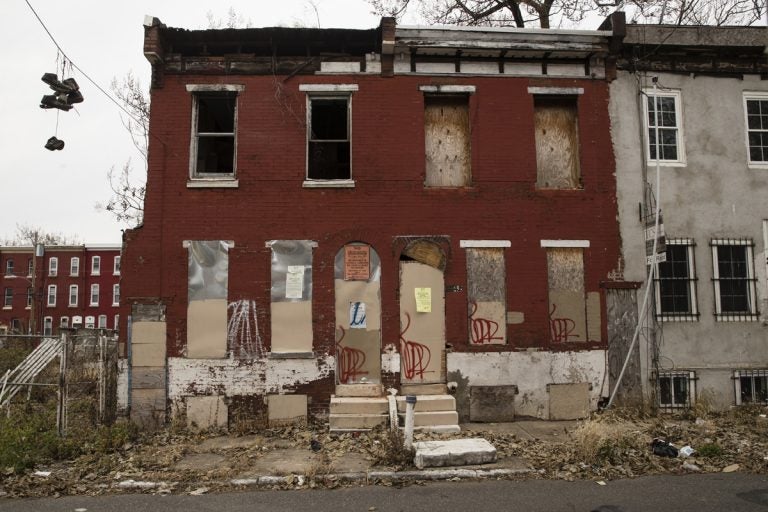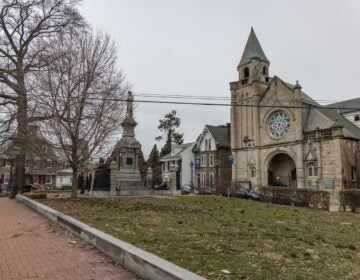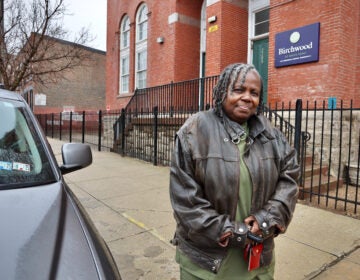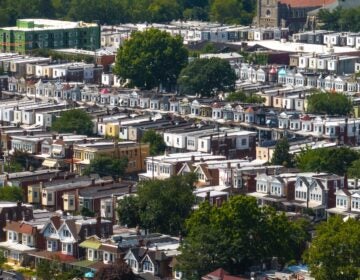Philly City Council probes blight-busting law with hopes of change
Since its enactment in 2008, critics say Act 135 has harmed property owners in vulnerable city neighborhoods.

Shown are blighted and abandoned row homes in Philadelphia, Wednesday, Dec. 6, 2017. (AP Photo/Matt Rourke)
Have a question about Philly’s neighborhoods or the systems that shape them? PlanPhilly reporters want to hear from you! Ask us a question or send us a story idea you think we should cover.
City Council may create a task force dedicated to improving Act 135, a state law critics say has been a mixed bag for Philadelphia property owners.
Enacted in 2008, Act 135 was intended to provide a mechanism for neighbors, nonprofit organizations and municipalities to revitalize abandoned and blighted buildings in their communities. While the measure has provided relief to blocks burdened by these properties, opponents say the law has also unjustly targeted property owners in gentrifying neighborhoods.
“Someone can file a petition on a property within a multiple mile radius. We think that also invites speculation, that also invites predatory behavior and it also sort of works against the original intent of Act 135,” said Councilmember Jamie Gauthier.
Gauthier voiced support for creating a task force during a committee hearing held Thursday to explore the failings of Act 135, a shorthand for the Abandoned and Blighted Property Act. Councilmember Mark Squilla raised the possibility after it was suggested by a witness, saying a task force could be a good vehicle to propose changes to the law. The move would require Council approval.
“We just want people from both sides to be able to be part of that,” said Squilla, who chairs the Committee on Commerce and Economic Development.
In Philadelphia, nonprofits are the most prolific users of Act 135. Under the law, certain organizations can petition for property conservatorship. If a judge grants the request, the organization takes control of an abandoned property, enabling the group to remedy any code violations. In some cases, the group can then sell the property and take a substantial fee — up to 20% of the sale price. The measure also enables the conservator to recoup all legal fees and repair costs.
Philadelphia saw more Act 135 petitions after the law was revised in 2014 to include those financial benefits. Many of those petitions were filed by Scioli Turco, an organization tied to the nonprofit Caring People Alliance. Scioli Turco is now called reBuilding Blocks, but managing director Beth Grossman said the organization’s mission remains the same: helping neighbors adversely impacted by abandoned and blighted buildings. That includes homeowners living in fear because they live next door to a crumbling property that could collapse, as well as residents whose property values are taking a hit because of the blight.
“What cannot be ignored are the sufferings of neighbors because neighbor properties — that’s their generational wealth,” said Grossman during Thursday’s hearing. She said her organization is not predatory.
Some property owners would disagree, including Shane Randall.
In 2018, Scioli Turco petitioned to become the conservator of a decaying family home in Graduate Hospital, one of the city’s wealthiest neighborhoods. Randall had inherited the house on South 23rd Street from his mother, and planned to renovate it but never got the chance. After fighting the petition, filed on behalf of a fearful neighbor, he lost the valuable property and thousands of dollars to Act 135.
“It was going to be my family’s dream home. I felt special and honored that I’d be living in a house where my ancestors lived. That house had so much character, history and so many stories,” said Randall, a former social worker with the Philadelphia Fire Department, during his testimony.
Randall called his court battle a “nightmare.” After a judge granted him six months to make a series of repairs, he said he went “above and beyond” to satisfy the court to no avail. After spending thousands on renovations — brickwork, new stucco and paint, and new windows — the judge still signed off on the conservatorship, he said.
“The petitioner pointed out tiny problems with the work. The court believed them, not me. And just like that, my conditional relief was revoked. I was devastated,” said Randall.
Grossman has said Randall’s work was “absolutely substandard,” and that he did not fulfill his obligations to the court.
Thursday’s hearing also included testimony from researchers at the University of Pennsylvania who reviewed every Act 135 petition filed in Philadelphia between October 2009 and February 2024.
Elizabeth Shackney, who co-authored the report, conducted by the Advocacy for Racial and Civil Justice Clinic, told lawmakers that more than half of the 670 petitions were filed in Philadelphia neighborhoods where residents are at risk of displacement as a result of gentrification — and that Black and Asian American property owners were disproportionately impacted by Act 135 petitions.
In Philadelphia, Black residents own 35.6% of homes but account for 42.7% of respondents, according to the report. Asian American homeowners represented 11.8% of respondents but Asian American residents own 7.2% of homes.
“Act 135 was not intended to provide an end run for developers to acquire houses from vulnerable homeowners. Act 135 was enacted to combat blight through community-led development,” said Shackney.

Subscribe to PlanPhilly
WHYY is your source for fact-based, in-depth journalism and information. As a nonprofit organization, we rely on financial support from readers like you. Please give today.









